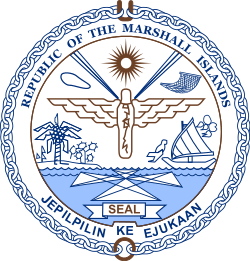Elections in the Marshall Islands
 |
| This article is part of a series on the politics and government of the Marshall Islands |
|
Elections in Marshall Islands gives information on election and election results in Marshall Islands.
Marshall Islands elects on national level a head of state - the president - and a legislature. The president is elected for a four-year term by the parliament. The Legislature (Nitijela) has 33 members, elected for a four-year term in single-seat and five multi-seat constituencies. The Legislature was last elected 17 November 2003 without the participation of parties, though part of the members could be members of the United Democratic Party. The Marshall Islands is a state in which political parties have not been active.
There have been a number of local and national elections since the Republic of the Marshall Islands was founded. The United Democratic Party, running on a reform platform, won the 1999 parliamentary election, taking control of the presidency and cabinet. The new government has publicly confirmed its commitment to an independent judiciary.
The first two presidents were chiefs. Kessai Note is a commoner.
Political parties
Traditionally there have been no formally organized political parties; what has existed more closely resembles factions or interest groups because they do not have party headquarters, formal platforms, or party structures; the following two "groupings" have competed in legislative balloting in recent years - Kabua Party (Imata Kabua) and the United Democratic Party (UDP) (Litokwa Tomeing).
| Members | Seats |
|---|---|
| Independents | 33 |
| Total | 33 |
| Most of the MPs elected are either members of the United Democratic Party or Aelon Kein Ad. | |
2003
| Members | Seats | Change |
|---|---|---|
| United Democratic Party | 20 | +1 |
| Aelon Kein Ad | 13 | -1 |
| Total | 33 |
Past elections
See also
- Government of the Marshall Islands
- Politics of the Marshall Islands
- List of Presidents of the Marshall Islands
- Electoral calendar
- Electoral system